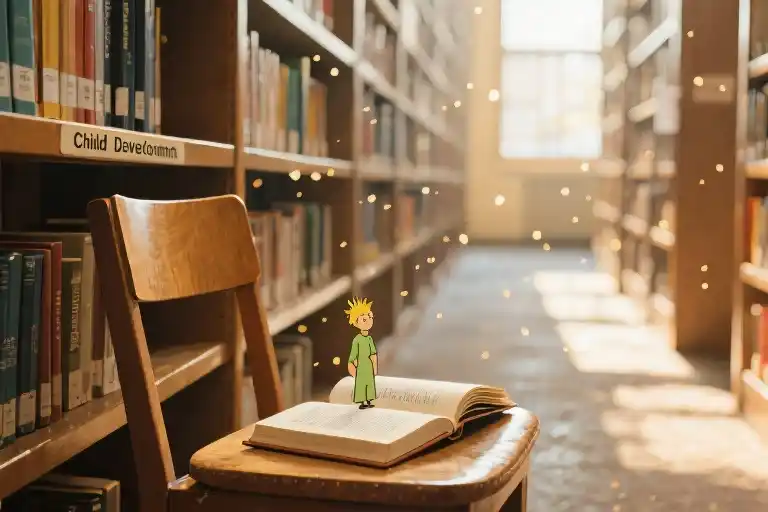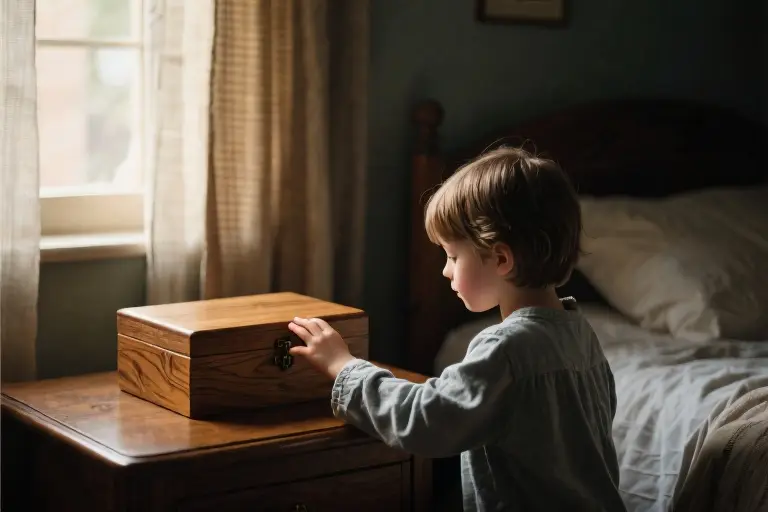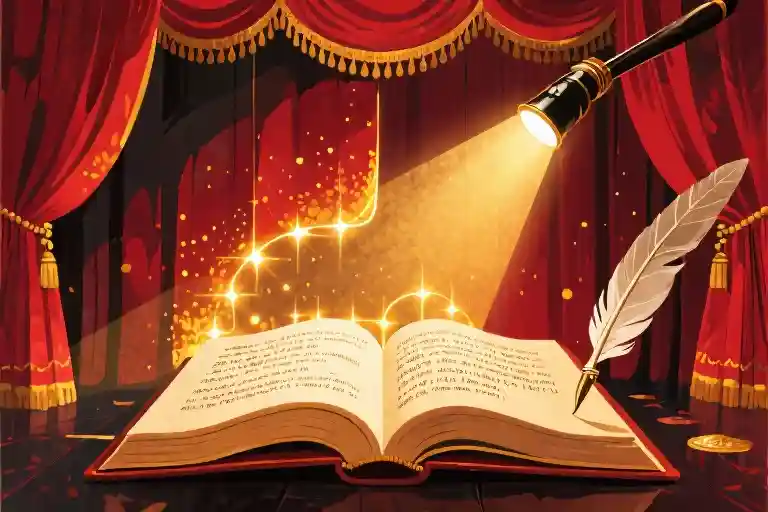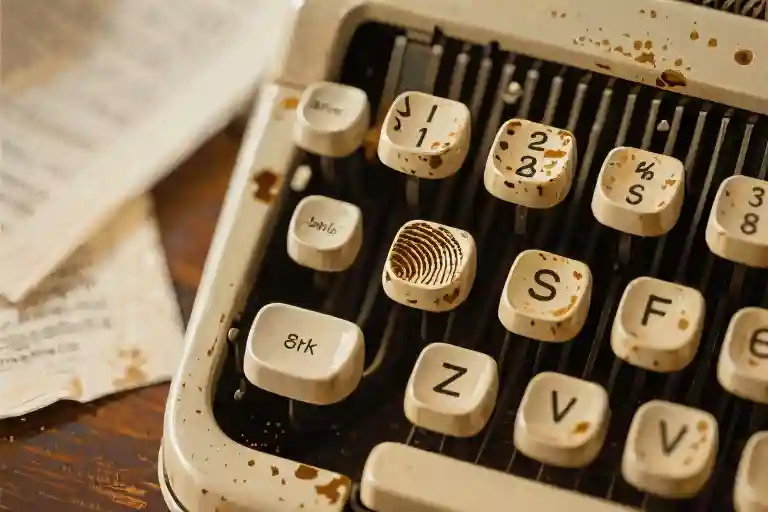The library smells of aging paper and forgotten promises. In the farthest corner, her fingers trace the worn edges of The Little Prince‘s cover with a reverence reserved for sacred texts. A muscle twitches at the corner of her mouth—the same involuntary spasm that appears when she accidentally brushes against the scar on her left knee, the one from the bicycle accident the summer before everything changed.
I hover between the stacks, this weightless witness to her rituals. The sunlight slants through high windows, painting golden rectangles across oak tables where students highlight textbooks and retirees do crossword puzzles. None notice the woman in the gray cardigan who visits every Tuesday at precisely 10:15 AM, nor how she lingers three minutes longer at the J aisle than anywhere else.
I could drift through these shelves forever, she’d told me once when I still occupied space in her world. Now I slip through the gaps between Dickens and Dostoevsky, able to penetrate leather bindings but powerless to cross the saltwater barrier glistening on her lashes. The physics of grief defy even spectral laws—her sorrow creates event horizons even shadows cannot breach.
A librarian wheels a cart past, its squeaky axle scattering the quiet like startled birds. Mother doesn’t flinch. She’s perfected the art of stillness, this woman who used to laugh so freely her tea would slosh from mismatched mugs. The version of her that exists in this hushed sanctuary seems carved from the same weathered oak as the bookshelves, her spine curved like a question mark against the window’s light.
Some sadnesses don’t fade; they migrate—from eyes to shoulders, from words to silences. I learned this truth watching her transform over countless library visits. The way her hands developed tremors when reaching for parenting guides she’d never check out. How she began wearing long sleeves even in summer to hide the crescent-moon nail marks on her forearms.
Behind her, two students whisper over shared earbuds. To their left, an elderly man chuckles at a newspaper cartoon. Normal sounds in this temple of normalcy. None hear what I do—the barely-there hitch in her breathing when she finds the inscription on The Little Prince‘s title page: For my star-gazer, love Daddy. The ink has faded to sepia, but the memory bleeds fresh as she snaps the book shut.
Outside, spring wages its annual rebellion against winter. Cherry blossoms confetti the sidewalk where she’ll soon walk, past the café where young mothers cluster with strollers, beyond the park where a particular wooden bench faces away from the playground. But for these suspended moments in the library’s amber light, she exists in the fragile equilibrium between what was and what might have been—a tightrope walker balanced above the chasm of invisible grief.
I stretch my shadow across the returned books cart, aligning its darkness with the silhouette she casts on the linguistics section. Our profiles almost touch. Almost. The closest we come to contact these days is when her shadow accidentally overlaps with mine on sunlit pavement, a fleeting intimacy that goes unnoticed by everyone but the bereaved and the barely-there.
The Library Protocol
Every Tuesday at 10:15 AM, her worn leather shoes make the same hollow sound against the library’s marble steps. The rhythm never changes—three quick steps, a pause on the landing where sunlight stains the floor honey-gold, then five slower steps as she reaches for the brass door handle. I’ve counted them 137 times.
Inside, her shoulders drop just slightly. The scent of aging paper and pencil shavings wraps around her like an old sweater. She walks past the new releases display without glancing at the brightly covered bestsellers, moving instead toward the dimmer aisles where the light falls in slants between tall shelves.
She always stops here. Her fingers trail along the spines until they reach “Child Development Through Stories.” For three breaths—I count them—her index finger presses against the gold-embossed title. Then she pulls back as if burned.
Flash. A memory surfaces: me at five, legs swinging from one of those tiny rainbow chairs she loved. Her voice reading Charlotte’s web while I twisted her hair around my sticky fingers. The phone ringing. Father’s voice sharp through the receiver. Her shoulders tensing as she mouthed “later” to me. The way she never finished the chapter.
Today, a young mother kneels nearby helping her toddler pull books from the bottom shelf. My mother’s breath catches. She turns abruptly, nearly colliding with a rolling cart of returns. The librarian gives her a curious look—”the gray-scarf lady” they call her in the break room, though no one knows she cries in the biography section when she thinks the stacks are empty.
At the study carrels, she opens a novel but doesn’t read. Her thumb rubs absently over the corner of page 47 where someone has dog-eared it. The shadow of my hand almost touches hers. Almost.
Three tables away, a student highlights a psychology textbook. The words “complicated grief” glow neon yellow in a beam of afternoon light. My mother stands suddenly, chair scraping. The sound makes two teenagers look up from their phones. She smooths her scarf and walks toward the exit, leaving the unread book splayed open like a wounded bird.
Outside, the wind carries the scent of rain. She pauses under the awning, watching droplets darken the pavement. Somewhere beyond the storm clouds, I imagine our old house with its empty chair at the kitchen table, the silence where my laughter used to live. The space between what was and what remains—that’s where we meet now, in the margins of her unspoken sorrow.
The Park Detour
She takes the long way through the park every Tuesday, adding twelve minutes to her commute. The fountain plaza shimmers ahead, its circular benches always crowded with strollers parked like pastel-colored satellites. Mothers lean toward each other, laughter bubbling louder than the water. From my vantage point in the dappled shadows of the oak tree, I watch her fingers tighten around the strap of her library tote.
Her body knows before her mind does—a slight hitch in her step, shoulders curving inward as if making herself smaller could make the scene before her smaller too. A woman adjusts the sunshade on her pram, revealing a tiny hand waving at the sunlight. My mother’s breath catches audibly, though no one but me seems to hear it over the splashing fountain.
Cross now, I think desperately. The crosswalk light just turned. But she’s frozen mid-step, watching the baby’s fingers open and close like she’s trying to memorize the motion. The scene fractures into a hundred painful what-ifs: what if she’d brought the yellow-striped sunhat she bought last spring? What if she’d packed the board book we never got to read together? What if the woman with the pram turned and asked the question that hangs between them like a soap bubble?
“Do you have children?”
In my imagination, my mother doesn’t flinch. She meets the woman’s eyes and says something true but not cruel: “Mine lives in the unwritten stories.” But reality is less kind. When the stroller group shifts toward her bench, she abandons her usual path completely, cutting across the muddy grass where sprinklers have left the earth soft. Her good shoes—the leather ones she wears to the library—sink slightly with each hurried step.
Psychologists call this traumatic avoidance, though my mother would never use the term. Her doctor’s office pamphlets mention complicated grief in sterile bullet points, but they don’t capture how loss rewires the nervous system—how the brain marks certain sights and sounds as landmines long after the heart insists it’s healed. I want to whisper this to her as she hurries past the duck pond, where a toddler’s squeal makes her veer abruptly left: Your body is just trying to protect you. This pain means you loved deeply.
By the time she reaches the library steps, there’s grass staining her shoes and an extra crease between her eyebrows. She pauses to smooth her hair, and for a moment I think she might turn back—might brave the fountain route home to prove something to herself. But then the automatic doors whoosh open, releasing the familiar scent of aging paper and pencil shavings, and her shoulders drop half an inch. The books don’t ask impossible questions. The stories don’t demand she choose between numbness and agony.
As she disappears into the stacks, I linger by the park bench where she’d been sitting. A single forgotten item winks up at me: her grocery list, fallen from her pocket during her retreat. Between whole milk and dish soap, she’d started writing something else—the letters ul before the pencil mark trails off into the paper’s grain. I trace the ghost of that unfinished word, knowing it could have been ultrasound or ulysses or simply unbearable. Grief lives in these margins too, in the words we almost say but don’t.
Later, when she reemerges with her weekly stack of novels, she’ll take a different street home entirely—one lined with office buildings and dry cleaners, where the only babies are the ones in stock photo frames at the pharmacy counter. She’ll walk briskly, eyes on the pavement cracks, and no one will guess that her detour adds twenty-three extra minutes to her journey. No one but me, counting each step she takes to avoid the life she might have had, measuring the distance between what is and what almost was.
The Notebook Theory
Her kitchen counter holds the archaeology of a life paused—grocery lists in smudged ink, pharmacy receipts folded into origami cranes of avoidance. The top note reads “buy milk, pay electric bill” in her looping cursive, but beneath it, something darker. Three attempts to scribble out the words “ultrasound appointment”, the paper worn thin from erasures. This is where grief lives now: in the margins of shopping lists, between reminders to water plants and return library books.
I hover near the fridge magnet holding a takeout menu from that Thai place father loved. The edges are brittle from her fingers tracing the phone number too many times without calling. Adults are masters of this—hiding earthquakes between commas, burying tsunamis under Post-it notes. Her sadness doesn’t roar; it whispers in empty checkboxes and half-finished crosswords.
In her bedside drawer, a notebook gapes open to February. Neat rows of “8am: vitamins” and “3pm: conference call” break at the 14th, where the page holds only a water-stained circle. That date once held birthday cakes with blue frosting, tiny hands clapping off-beat to “Happy Birthday”. Now it’s a geological layer of pain compressed beneath “dry cleaning pickup”.
Psychologists call these “avoidance artifacts”—the physical traces of what we can’t bear to name. I’ve compiled her shadow archive:
- The Calendar Skip: Every April, she tears out the entire month rather than face the square marked “school play”.
- The Playlist Curse: Her “Chill Vibes” Spotify list always deletes itself after track #7—“You Are My Sunshine”.
- The Oven Timer: Still set for 20 minutes, the exact time it took to bake chocolate chip cookies in heart-shaped molds.
“Living in the margins” isn’t just poetry—it’s survival arithmetic. Subtract the unbearable moments, carry forward the tolerable ones. Her world has become an equation where:
(visible life) – (invisible grief) = enough to get through the day
This morning I watched her pause before tossing expired coupons. Her thumb lingered over one for “Buy One Baby Onesie, Get One Free”. The paper fluttered into the trash, but the way her shoulders folded inward told the real story—some losses never become garbage; they become ghosts that haunt discount flyers and diaper commercials.
Your Turn: #MyMarginMoments
We all have these hidden fractures. Maybe yours is:
- The contact still saved as “Dad (Home)” after twelve years
- Avoiding aisle 3 at the supermarket where the cereal he loved gleams under fluorescent lights
- That one unplayed voicemail you keep like a grenade with the pin half-pulled
Where does your invisible grief live? Share using #MyMarginMoments—sometimes bringing shadows into the light makes them less heavy to carry.
Later, I’ll find her staring at the ultrasound scribble again. The pencil strokes have nearly erased themselves from her worrying fingers, like sorrow sanding away its own evidence. But grief is stubborn—it migrates from ultrasound images to grocery lists to the way she always buys two bananas out of habit, then lets the second one bruise untouched in the fruit bowl.
The Art of Unopened Books
The library’s closing bell echoes through the stacks as she lingers at the circulation desk, her fingers tracing the spine of The Art of Grieving. The librarian knows better than to comment on how this book has traveled between her card and the returns bin three times this month, its pages stubbornly uncut. I watch from the slanting afternoon light as she tucks it under her arm—not to read, but to borrow the possibility of reading.
Sunset bleeds through the stained-glass windows, casting prismatic shadows across the study tables where we once built forts from dictionaries. Now the light stretches my form across the shelf labeled Bereavement—Parental, elongating until my darkness blankets the book in her hands. A drop falls onto the plastic cover. The saltwater could be hers; it could be the storm gathering outside. After years between shadows, even I can’t distinguish precipitation from penitence.
Three truths live in this moment:
- She will place this book on her nightstand beneath unopened bills
- The overdue notices will arrive in crisp white envelopes
- Neither of us will mention the child-sized fingerprint smudge on page 47
When rain begins drumming against the library roof, she startles—not at the weather, but at the realization that darkness has fallen unnoticed. This is how sorrow operates: not as a sudden storm, but as the imperceptible creep of twilight that makes you question when exactly you lost the light.
Her footsteps echo through the emptying building, each click of heels on linoleum measuring the distance between then and now. At the exit, she hesitates with her hand on the push bar. For a breathless second, I believe she might turn back to reshelve the book properly. But grief is never that orderly. The door swings shut behind her, leaving me alone with the ghosts of stories we never finished.
Outside, streetlights flicker on. Their glow catches the raindrops sliding down the windows, making the glass weep in streaks of gold. I press my shadow-hand against the cool pane and wonder: Do the unread books on our shelves hold more hope than the ones we’ve dog-eared to death? The question lingers like the scent of rain on overdue pages.
When we hide from the light, do we become the shadow—or does the shadow become us?





